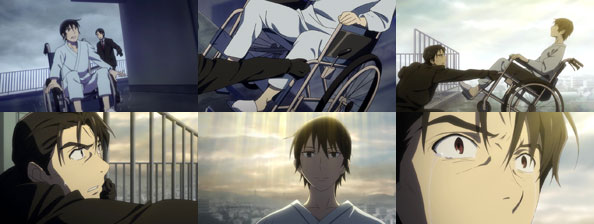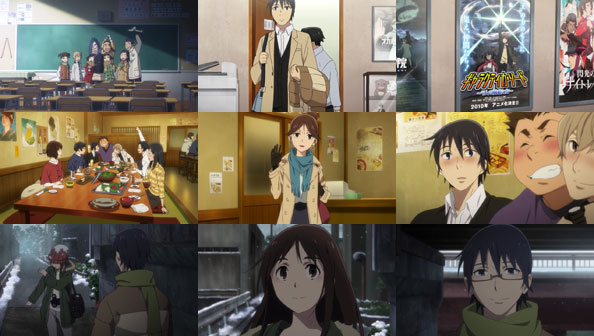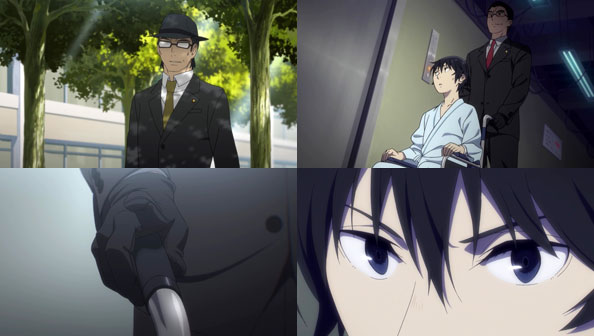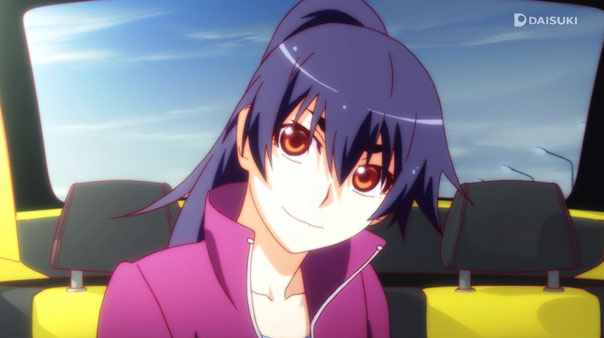
As soon as Hiro realizes the old man he killed wasn’t effected by his “air gun”, he bolts, and by bolt I mean launch into the sky and scream off like a fighter jet. Thus, the big standoff between him and Ichirou is postponed. But as he wakes up from a nightmare of the death he witnessed, Ichirou knows he’ll have to find and confront him sometime.
This boy is like him, but whether his powers have twisted him into a monster, or he was always a sociopath and only now has the means to do as he pleases, Ichirou knows he’s the only one who can stop him. Essentially, some whippersnapper needs an ear-boxing.
Hiro isn’t the first evil, nor is he the only evil in the world, or even in the vicinity of Ichirou’s home and work; far from it. You don’t need to be killed and reconstructed by an advanced alien race to be a dickbag that doesn’t care about anyone or anything, as evidenced by the kids who attacked a homeless man, or a group of athletic young toughs who plan to kill a man for daring to tell them to wait in line.
Like any and every great hero, Ichirou doesn’t buy into a world where the strong unrelentingly prey on the weak. Why should he? He may be one of the two strongest beings on the planet. No, with strength comes not carte blanche, but noblesse oblige. Just as Hiro was a bad person before getting reconstructed, Ichirou was always a good and just man.

It’s only now, like Hiro, that he’s able to act on his kind and virtuous nature. When it looks bad for the poor man surrounded by much larger ones, Ichirou takes out the trash. But he doesn’t kill anyone, nor is there any malice in his actions; only a desire to stop a great wrong from being committed, and ensure the safety of those who cannot ensure it themselves.
Once his “Grampy-sense” detects a family struggling to escape a house fire, he wills the machinery within his back to come out and propel him to the danger in time to save them. He does so by singing the theme to Astro Boy.
At first, his built-in jetpack is a little too much to handle; he screams bloody murder as he’s flung every which way, a scene that’s as awesome as it is frikkin’ hilarious. In a show that gets as intense as this one, it’s nice to know we’ll always have some moments of levity.
He gets the hang of it pretty quickly, and manages to save not only the crying children’s father, but their grandmother as well. Instead of thanks and praise, he asks that they not mention him to the authorities, and having just been miraculously saved by him, one hopes they would respect his wishes.

Ichirou is an unconditional hero to all, not because he can, with his wondrous new powers, but because he feel he must. He wouldn’t be able to live with himself if he stood by and did nothing when his actions can make a positive difference in the world. Compare this to his pre-transformation, when he was just trying to maintain, and was diagnosed with terminal cancer for his trouble. A man of inaction, no longer is he.
Hiro, while a monster, seems to remain tied to his humanity through his best friend Andou, whom he finally convinces to come to school, promising to protect him. He is, or at least is trying to be, a hero of one…unfortunately for the rest of the world, not to mention Andou.
When the bullies return to Andou’s desk and threaten him, Hiro wastes no time taking the wrist of their strongest and squeezing it hard enough to make him cry, apologize, and insult himself and his friends.
I can’t tell whether Hiro is using laser-sharp precision to apply just enough pressure to the guy’s wrist, or struggling as hard as he can not to squeeze to hard, snap his arm off and expose himself at school. I like how there’s uncertainty in something like that.
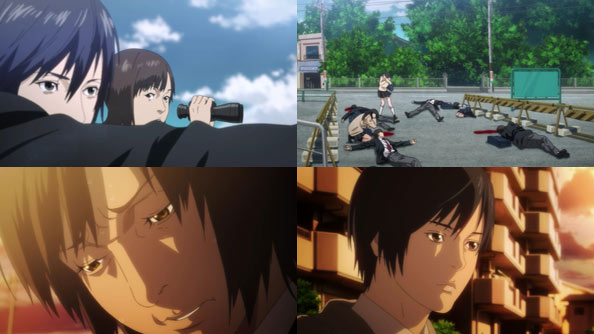
Hiro takes Andou to the roof where the bullies initially told them to meet, but they already left with some girls. Hiro gives Andou some binoculars and starts pointing out into the distance and saying “BANG.” Eventually, Andou pans to where Hiro was “shooting”, and finds the four bullies dead, all shot in the head with invisible bullets that leave no trace; the scared-shitless girls having no idea what just happened.
It’s too far. Andou is a gentle soul; he can’t take this shit, and wastes no time rejecting Hiro and warning him to stay away when Hiro refuses to turn himself into the police. All of the things Hiro did to that point to impress Andou—humiliate then kill bullies, boast of his ability to nuke China with US missile, steal thousands of dollars from the ATM—only serve to disgust Andou and push him further away.
Their friendship is over, but Hiro reacts the same way he does to everything, save his brief encounter with Ichirou: calmly. Too, calmly, if you ask me. Without Andou to provide even a semblance of a tether, Hiro’s monstrous acts may only increase in scale and scope.

Inuyashiki likes to punch below the belt, as when an adorable mama cat and her kitten walk past a charmed Ichirou, only for the mom to get hit by a car right in front of him. Exhibiting uncommon goodness that makes one’s eyes well up, he takes the cat into his arms, even though he can’t do anything for her…then learns that he actually can.
Ichirou scans that dead cat and fixes her right up, and she and her kitten stride off like nothing ever happened, giving Ichirou the one thank-you he wished he always got: no thank-you at all. Ichirou is overcome with joy and gratitude for the gift he has been given, and immediately stops by a hospital to heal as many people as he can.

And yet, as he’s been going around left and right saving lives, his opposite Hiro is out there taking them, as if the universe itself were maintaining the balance from suddenly having two such immensely powerful beings in such close proximity. If both were evil killers, humanity would be toast, but Ichirou is as good as Hiro is bad.
Witness the ending, in which the camera mercifully doesn’t follow Hiro inside another house for another routine family-killing. It just stays there, frozen, and we realize just how goddamn quickly Hiro purges the house of all life before walking out, spotting two passing boys—clearly friends—running past, and thinks long and hard about killing them too.
By holding his fire, was he trying to prove to himself that he can control himself when he needs to even without Andou? Perhaps he still has a degree of restraint, owing to the same sense of self-preservation that induced him to escape from Ichirou. But that restraint can’t last.
The first two episodes introduced our characters: the third explored their powers further and illustrated how far they can take those powers—in both moral directions. Hiro seems to be on the path to ruin; Ichirou, on the path to sainthood. But in a universe of balance, perhaps neither will ever reach their destination.







































